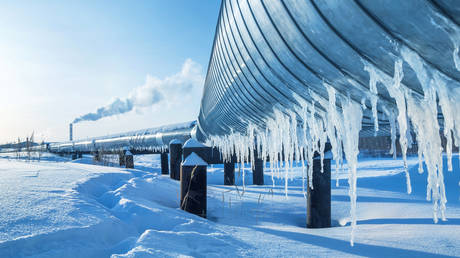
US vows to halve Russia’s energy revenues by 2030
Washington is committed to its sanctions policy, a senior official has told the FT
Washington will pursue its sanctions policy on Russian energy “for years to come” as it seeks to halve Moscow’s oil and gas revenues by 2030, a senior US official told the Financial Times on Friday.
The US has been leading international efforts to restrict Russian oil and fuel exports since the beginning of the Ukraine conflict last year.
Explaining Washington’s policy aims, Assistant Secretary of State for Energy Resources Geoffrey Pyatt told the FT: “The goal of these sanctions is to change Russia’s behavior and to ensure that [President Vladimir] Putin is not in a position, whenever some kind of peace is achieved… to use three or four years to rearm and prepare himself and prepare his military for stage three of the Ukraine invasion.”
The EU and G7 countries imposed a $60-per-barrel price ceiling on Russian seaborne crude which bans Western firms from providing insurance and other services to shipments of Russian oil, unless the cargo is purchased at or below the set price. The mechanism was introduced in December 2022 and was intended to reduce Moscow’s export revenues. It was followed by similar restrictions in February on exports of Russian petroleum products.
While Moscow’s revenues from oil and gas sales dropped by 46% year-on-year in January after the price cap was first enforced, they have since risen dramatically, dealing a blow to Western attempts to curb Russia’s energy proceeds.
Read more
West’s Russian oil price cap not working – WSJ
EU officials earlier acknowledged that Moscow has been successfully sidestepping the cap, as “almost none” of its crude shipments were sold at or below the price limit.
Washington, however, has argued that the restrictions have imposed significant costs on Moscow and has pledged to tighten the measures in a bid to damage the Russian economy.
“My colleagues at the Treasury who lead on this are looking very hard at the question of how do we ensure the continued effectiveness of this policy,” Pyatt said.
In another effort to reduce Russian energy profits, the US Treasury Department is seeking to increase the costs Moscow has to pay to run an alleged shadow fleet of tankers that reportedly have unclear ownership and insurance status, and on which the price caps have limited traction.
The US is looking for ways “to make that shadow fleet less effective,” according to Pyatt.
For more stories on economy & finance visit RT’s business section


